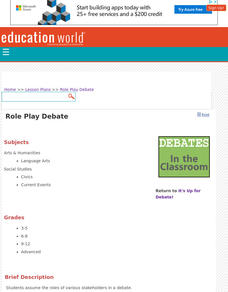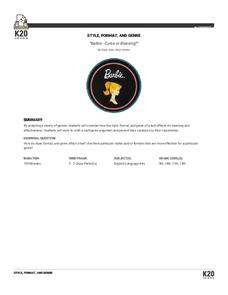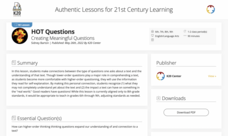Curated OER
Sustainable Livestock
Young scholars investigate healthy eating habits by researching livestock. In this food sustainability instructional activity, students research the negative impact factory farming has on our environment due to pollution. Young scholars...
Curated OER
Role Play Debate
Suggested topics for a role play debate include school uniforms and culpability for drunk driving, but any issue of interest to your class will work. What are the hot issues in your community or on the news right now? Class members...
Curated OER
The First (and Last) Words
What does "freedom of speech" mean to your class, especially in the context of Internet communications? In round-table discussion format, middle and high schoolers address the issues discussed in "State Legislatures Across U.S. Plan to...
Curated OER
Non-Verbal Communication
Many developmentally disabled students struggle with accurately conveying messages and interpreting those of others around them, especially when they are non-verbal. This lesson contains fun activities and exercises, such as talking with...
Curated OER
A Historical and Educational Perspective on American Sign Language
Using Sign Language to Communicate with Your Special-Needs Students in the Classroom
University of Oklahoma
Barbie™: Blessing or Curse? - Style, Format, and Genre
New ReviewBarbie has been an iconic figure in the lives of girls since the 1950s, but her existence has been full of controversy. A lesson plan on style, format, and genre explores that controversy by looking at three texts with different...
Curated OER
Socratic Seminar
To conclude their study of the letters of Abigail Adams, class members engage in a Socratic seminar where they discuss her writings and what her letters reveal about her.
K20 LEARN
Speak Up! Four Categories Of Speeches
High schoolers examine the four major types of speeches: informative, demonstrative, persuasive, and extemporaneous. Groups then select one type and craft and share a presentation highlighting this format's characteristics. Finally,...
K20 LEARN
Presenting with Confidence: Speech and Debate
Stage fright? Class members learn strategies to overcome stage fright and develop confidence when giving speeches and engaging in debates.
K20 LEARN
The K20 Chronicle, Lesson 2: How To Conduct An Interview
Young journalists learn how to prepare for an interview, conduct an interview, and craft good interview questions with follow-up questions. After they watch and analyze several interviews, class members select a senior to interview,...
K20 LEARN
HOT Questions: Creating Meaningful Questions
Scholars examine a list of questions and sort them into corresponding groups based on similarities. A gallery walk allows peers to see how their peers sorted questions and leave notes. Costa's Level of Questions is the topic of a...
Overcoming Obstacles
Giving Presentations
With their action plans in place, groups now develop a presentation to get others interested in their project. Scholars learn how to present themselves during a presentation and elaborate on and add visuals to their presentation. After...
Overcoming Obstacles
Writing Reports and Presenting to an Audience
A two-part lesson introduces learners to a six-step process for writing and presenting oral reports. Participants learn how to select, limit, and research a topic, how to organize their notes, draft and revise their reports, and practice...
Overcoming Obstacles
Reading, Listening, and Note Taking
Active listening is all about thinking, asking questions, and making connections. That's the take-away from a instructional activity about active listening. Participants learn techniques for identifying important information, including...
Overcoming Obstacles
Communicating Constructively
Some conversations are easy and enjoyable, while others are horrific! To begin a lesson on communicating constructively, class members list examples of conversations that are easy, average, and those that are difficult and identify what...
Overcoming Obstacles
Listening Critically
Eschew obfuscation!! High schoolers learn techniques that permit them to listen critically, sort through verbiage used to hide meaning or mislead listeners, and determine the message's validity.
British Council
What's Your Name?
What is your name? Scholars join in small groups to discuss questions about their names and listen to an audio about names before completing a worksheet. Afterward, individuals create a list of names heard in the audio and classify them...
British Council
Film Reviews
Scholars work in pairs to discuss a film they have both seen by answering 10 questions about the movie. They then individually work on a film review worksheet using a different film than the one previously discussed with a partner.
Franklin D. Roosevelt Presidential Library & Museum
What Does It Mean to be a Good Citizen?
Civics scholars are challenged to determine what it means to be a good citizen. Class members select three adults in their lives and interview them to discover what the term "good citizen" means to each of these people. The class then...
British Council
How Green Are You?
Go green! Scholars survey their classmates to determine how green they are and then write a report to summarize their findings. Finally, pupils agree on five changes they can make in their lives to help the environment.
British Council
Stairway to Nowhere (Lower Level)
Picture this! Scholars quickly sketch an image of what they think a picture of Stairway to Nowhere would look like. They participate in a fill-the-gap exercise where they complete sentences by filling in the blanks of the transcript as...
Franklin D. Roosevelt Presidential Library & Museum
Pearl Harbor Activity #4: Who is the Audience?
Young historians use the prompts on a worksheet to analyze President Roosevelt's "Day of Infamy" speech. They identify the intended audience for the speech, the devices FDR used to persuade his audience, the responses promoted, and the...
Franklin D. Roosevelt Presidential Library & Museum
Pearl Harbor Activity #2: Why Do Words Matter?
Words matter! That's the big idea behind an activity that asks scholars to replace words in FDR's "Day of Infamy" speech with synonyms. They then listen to a recording of President Roosevelt's address and compare his version to their own.
Newseum
Covering a Catastrophe: Press Conference Simulation
Young journalists have an opportunity to experience the challenges of covering a catastrophe by staging a mock press conference. Half the class acts as reporters while the others act as officials from the mayor's office.

























